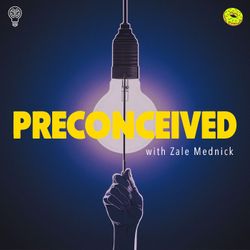Latest episode

305. Can You Fall In Love With AI?
43:33|Is it possible to love an AI? In this episode, we delve into the fascinating intersection of artificial intelligence and romantic relationships. Dr. Marnie Feuerman joins us to discuss the potential benefits, risks, and ethical considerations of AI in our intimate lives. Discover how AI might fulfill our deepest needs for love and connection, and where it falls short.Learn more about Dr. Marnie Feuerman at https://www.drmarnionline.com/
More episodes
View all episodes

304. Do People Feel Guilty After Cheating?
46:57|In this episode of Preconceived, Zale explores the often misunderstood topic of infidelity, revealing why cheating is more common and psychologically complex than it appears on the surface. Joined by Dr. Dylan Selterman, a Johns Hopkins psychology professor, this discussion uncovers the motivations, psychological factors, and societal influences around cheating in relationships. Notably, the episode delves into the surprising revelation that many individuals do not regret cheating, examining the underlying psychological and emotional factors that contribute to this mindset.Learn more about Dylan Selterman at https://www.dylanselterman.com/
What Is Life Really Like In North Korea?
58:29|There is perhaps no country in the world more perplexing and bewildering than North Korea. Considered by many as a silo shut off from the rest of the world, much of North Korea is shrouded in mystery. Unfortunately, much of that mystery involves a dictatorial regime and severe oppression of its peoples. But what exactly does it look like inside of North Korea? What are our preconceptions about North Korea, and equally important, what are the preconceptions that North Koreans might hold about the rest of the world? Brandon Gauthier joins the podcast.
303. Why Do People Become War Journalists - and What Does It Do To them?
44:48|In this episode of Preconceived, Zale engages with Dr. Anthony Feinstein to explore the intricate world of war journalism. They discuss the psychological hurdles faced by war correspondents, the motivations that drive them into conflict zones, and the unique challenges they encounter compared to military personnel. Dr. Feinstein shares insights from his pioneering research on the mental health of journalists, highlighting the importance of understanding trauma and the moral responsibilities of news organizations. This conversation offers a deep dive into the resilience and courage required in one of the world's most demanding professions.
302. Defensive Pessimism - Are There Some Benefits to Negative Thinking?
31:44|In this episode of Preconceived, Zale explores the concept of happiness and melancholy with Professor Julie Norem, a psychology expert from Wellesley College. They delve into the strategy of defensive pessimism, discussing how it can be a beneficial approach for managing anxiety and achieving goals. The conversation also touches on societal pressures to maintain constant happiness and the value of embracing negative emotions as part of a rich, authentic life.Check out Julie's book at https://www.amazon.ca/Positive-Power-Negative-Thinking/dp/0465051391
301. Is Democracy Dying?
55:42|In this episode of Preconceived, Zale explores the concept of democracy and its current state in the world, particularly in the United States. He is joined by Peter Biro, a lawyer, writer, and NGO leader, who discusses the importance of not taking democracy for granted and the potential threats it faces. The conversation delves into the meaning of democracy, its perceived sanctity, and the role of liberal constitutionalism in combating democratic backsliding.
300. The Wokeness Debate - Unpacking Gender Identity and Cultural Shifts
01:05:15|In this 300th episode of Preconceived, we dive deep into the intricate world of wokeness—a term that has sparked both fervent support and intense debate. What does it truly mean to be 'woke'? How has this cultural phenomenon reshaped our conversations around identity, free speech, and societal norms? Join us as we unravel these questions with our guest, Eric Kaufman, who brings a wealth of knowledge and a critical eye to the discussion. Check out Eric's latest book Third Awokening at https://www.amazon.ca/Third-Awokening-12-Point-Progressive-Extremism/dp/B0D459XT8N